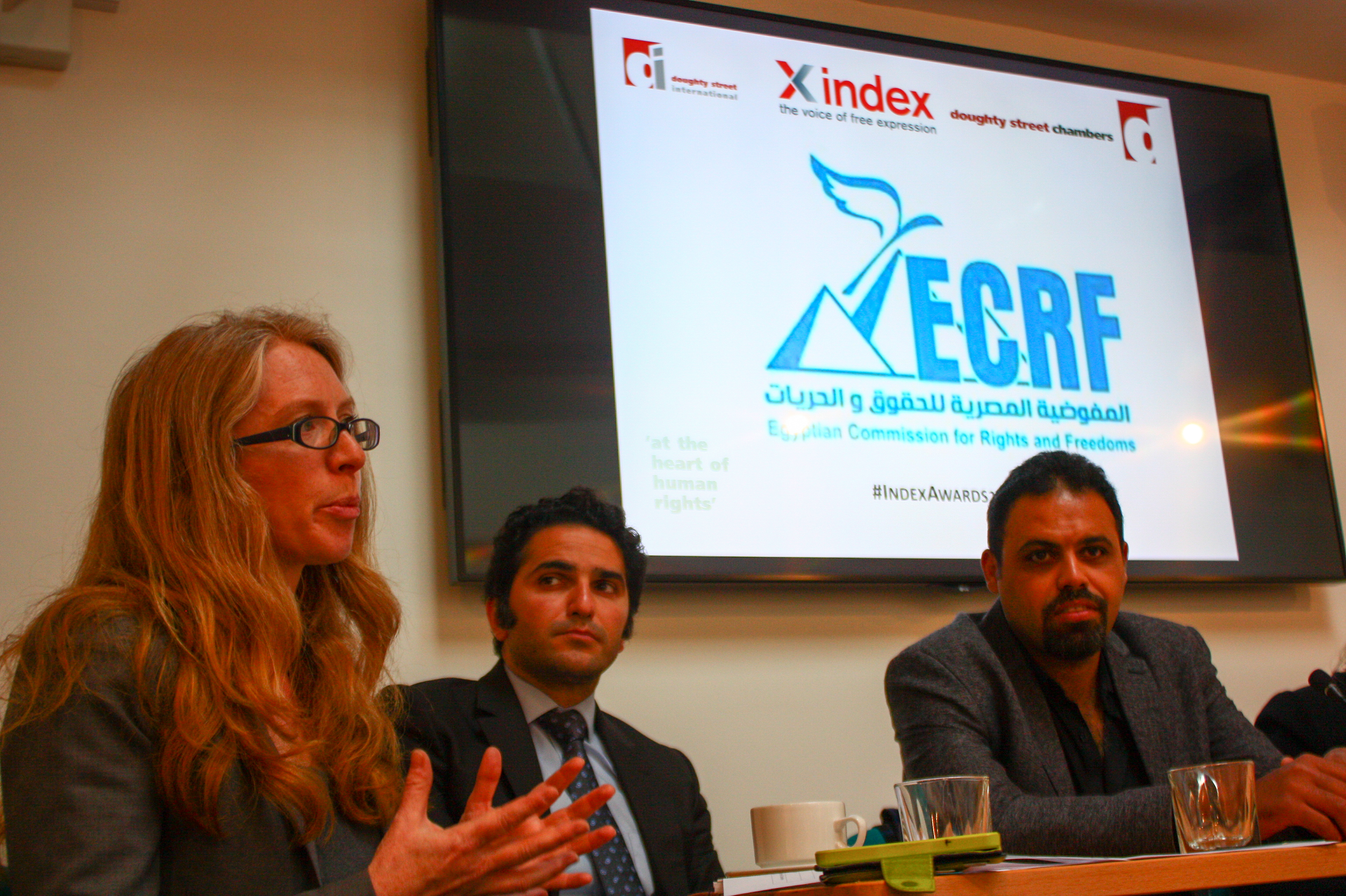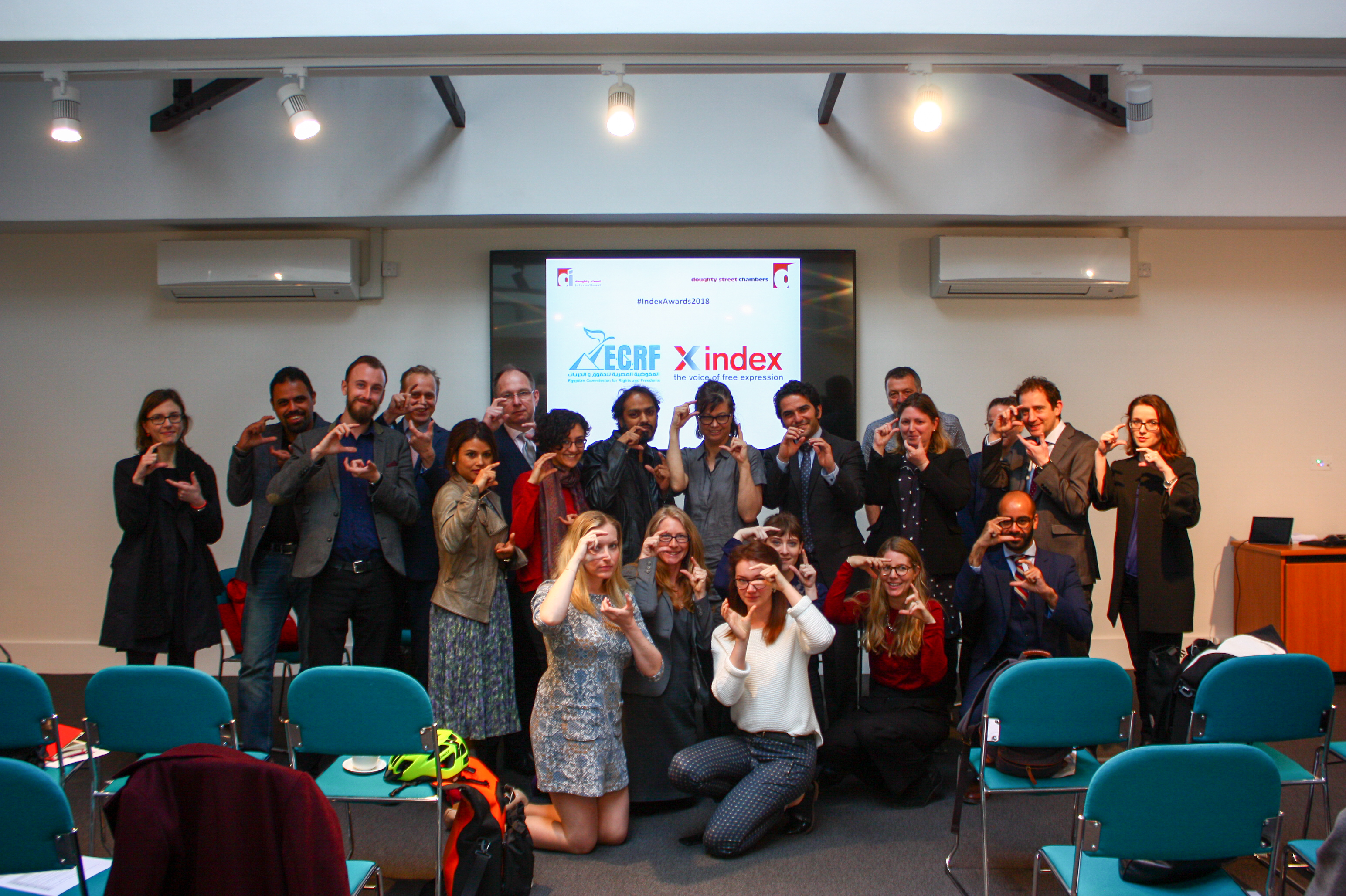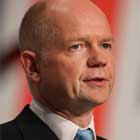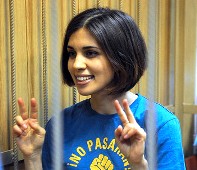18 Apr 2018 | Egypt, News and features
[vc_row][vc_column][vc_column_text]

Index on Censorship’s CEO Jodie Ginsberg discusses change in Egypt with activists Mohamed Sameh and Ahmad Abdullah (Photo credit: Alessio Perrone)
The opening line of Rousseau’s treatise The Social Contract reads: “Man is born free, and he is everywhere in chains. Those who think themselves masters of others are indeed greater slaves than they.”
This was one of several books to feature in a book club started by Ahmad Abdallah during his four and a half months spent in prison. The co-founder of the Index on Censorship Freedom of Expression Award nominee Egyptian Commission for Rights and Freedoms (ECRF) was arrested without a warrant on 25 April 2016 for alleged terrorist activity.
Awoken by masked members of the special forces prodding him with a machine gun he first thought it was a prank, he recalled at an event discussing human rights in Egypt on 17 April 2018 at Doughty Street Chambers.
The worst of the worst
“I thought it was someone joking, maybe my mum, maybe my father,” he said. “But I got up and then I was afraid for my family. I was pushed by the machine gun once again and my parents were at the side of the door. Then I ask the chief of this group: ‘do you have a warrant for me?’ They showed me nothing, they searched my house and then I was detained.” They said, “what will you do if we don’t have one?”
Index on Censorship CEO Jodie Ginsberg condemned the Egyptian authorities for the misuse of terror legislation to persecute peaceful critics like Abdallah and his colleague Mohamed Sameh.
Speaking to the room, Abdallah told of his continued attempts to challenge repressive ideas and the Egyptian government even while in prison.
He was shocked to be branded a terrorist. “I had nothing to do with these groups. I was jailed with some of our brotherhood and even some of ISIS. I was very afraid at this time. They are the worst of the worst,” he said.
His answer to this fear was books. “I started a book club because I was afraid of the ISIS guys,” he said.
“I was really afraid so I said: ‘OK, why don’t we start a reading club. We have plenty of time, we are in jail! You can bring your books and I can bring my books, maybe we can be more enlightened. I got them books: Rousseau’s Social Contract, literature books, Kafka, philosophy books, Orwell’s 1984 and Animal Farm and as one month elapsed, the ISIS guy was isolated. Everyone was against his ideas and my ideas were spreading amongst other prisoners,” the human rights defender continued.

Attendees of the seminar in group solidarity for Egypt and Shawkan, the persecuted photojournalist #mypicforshawkan (photo credit: Alessio Perrone)
As a result, Abdallah was put in solitary confinement where he was in complete darkness and without food for two days.
“Egyptians are not low rank humans. We need our fundamental rights like everyone else”
Human rights activists and journalists are systematically targeted in Egypt and, like Ahmad Abdallah, called terrorists. Jeremy Dear, representing the International Federation of Journalists at the event, informed attendees 21 journalists have been killed in the country since 2011. More than 20 have been imprisoned, half of which without charge.
Forced disappearances and media harassment
The precise numbers of those targeted are unknown, even to the ECRF. The organisation was set up in 2013 after someone came to Abdallah and Mohamed Lotfy (executive director and co-founder of ECRF) saying his friend had gone missing. This led them to question whether the disappearance was “a single event or a pattern.”
The organisation, nominated for an Index on Censorship Freedom of Expression Award, has since worked on cases involving forced disappearance and the prevention of censorship. The government has made it increasingly difficult for them to conduct their work and their offices were raided twice last year. Their website was also blocked.
The group continues to work towards improved human rights despite the dangers. Ahmad said it is their passion and desire for change that keeps them going. “Egyptians are not low rank humans. We need our fundamental rights like everyone else,” he added.
Sameh continued: “Why do we continue? Much sacrifice has already been done. We really do love Egyptians, we really love humans, we really love our families and we think there is a better way of living, of respecting each other. The reason we keep going is because we think we can change that. I think there is serious hope that we can achieve something. We are showing these people are not left behind, that they are not forgotten.”
Peter Greste, an Al Jhazeera journalist who was imprisoned in Egypt, sent a video message of support Abdallah and Sameh. He told of how in 2014 they had been convicted under terrorist charges. Greste said: “The charges were related to the work we had been doing for Al Jhazeera English… At the time, I struggled to make sense of what they were going through, the gap which was between what they were accused of doing, joining a terrorist group, and what they were actually doing… I couldn’t understand how anyone could draw the conclusions that the prosecution… came to.”
The seminar, “Freedom of Expression and the Protection of Human Rights in Egypt,” concluded hopefully. Ginsberg from Index on Censorship posited several ways those in the room could help. This included a suggestion that media organisations each take a case and closely follow it.
She said: “I know sometimes we think we are sitting here talking and nobody’s paying attention, but actually these kind of public solidarity actions do matter. They matter to the individuals who are in detention and they also matter and bother the authorities.”
Jeremy Dear agreed, emphasising the importance of support from societies with media freedom. He said: “There’s no doubt that in the past few years the space for dissenting and independent voices has shrunk in Egypt. We have a duty to ensure that we are doing everything that we can to create the space for them and help them create their own space to raise their own voices.”[/vc_column_text][/vc_column][/vc_row][vc_row][vc_column][vc_basic_grid post_type=”post” max_items=”4″ style=”load-more” items_per_page=”4″ element_width=”6″ btn_shape=”square” btn_align=”center” grid_id=”vc_gid:1524045621403-609ab883-1e90-3″][/vc_column][/vc_row]
3 Aug 2012 | Campaigns, Middle East and North Africa, Statements
 Index joins a group of international rights groups in calling on UK Foreign Minister William Hague and US Secretary of State Hillary Clinton to push for the prisoners’ release
Index joins a group of international rights groups in calling on UK Foreign Minister William Hague and US Secretary of State Hillary Clinton to push for the prisoners’ release
Since March, Emirati authorities have arrested over 50 activists and human rights defenders in a widespread crackdown on dissent.
Dear Foreign Secretary,
We are writing to draw your attention to some disturbing human rights developments in the United Arab Emirates, where the authorities have launched a campaign of arrest, arbitrary detention and deportation to repress and intimidate peaceful political activists.
Since late March, the authorities there have arrested at least 50 Emirati civil society activists and human rights defenders. In recent weeks there has been a marked escalation in the crackdown on those advocating political reform in the UAE, with two prominent human rights lawyers, Mohammed al-Roken and Mohammed al-Mansoori, amongst those detained in a spate of arrests and detentions.
Although none of those arrested have been formally charged with any offence, there are strong indications that the detentions are being linked to issues of national security. A July 15 statement by the UAE’s official news agency said Attorney General Salem Sa’eed Kubaish had ordered the arrest and investigation of “a group of people for establishing and managing an organisation with the aim of committing crimes that harm state security”. The statement also accused this group of having connections with “foreign organisations and outside agendas” and promised to “expose the dimensions of the conspiracy”.
Al-Roken is a prominent human rights lawyer in the Emirates, and has provided legal assistance to al-Islah members detained without charge since March, including a group that authorities stripped of their citizenship. In 2011 he served as co-defence counsel for two of the five activists known as the “UAE 5 ,” who were imprisoned for seven months and tried in 2011 after allegedly posting statements on an internet forum critical of UAE government policy and leaders.
Al-Mansoori is the deputy chairman of al-Islah and a former president of the Jurists’ Association. The UAE authorities dismissed him from his position as a legal advisor to the government of Ras Al Khaimah in January 2010 after he gave a television interview in which he criticised restrictions on freedom of speech in the country. They have barred him from travelling since October 2007 and have refused to renew his passport since March 2008.
On 24 July the Abu Dhabi Court of First Instance sentenced a former judge and University of Sharjah law professor, Dr Ahmed Yousef al-Zaabi, to 12 months’ imprisonment for fraud and assuming another person’s identity. Al-Zaabi’s conviction was based on the fact that his passport still registered his profession as “judge” after his public support for political reform in the UAE had resulted in him being forced into retirement. The authorities’ targeting of lawyers has discouraged members of the Emirati legal profession from offering their services, thereby denying the detained men legal assistance.
On 16 June, the UAE deported Ahmed Abd al-Khaleq, an advocate for the rights of stateless residents known as Bidun. He had been held in detention without charge or explanation since 22 May and was informed that he would be indefinitely detained if he did not agree to leave the UAE. Abd al-Khaleq is one of the UAE 5. UAE authorities charged the UAE 5 in early June 2011 under articles 176 and 8 of the UAE Penal Code, which criminalise “public insults” of the country’s top officials. They were detained throughout a seven-month pre-trial and trial process. The Federal Supreme Court convicted them on 27 November and sentenced them to between two and three years in prison. Shortly afterward, Shaikh Khalifa bin Zayed Al Nahyan, the UAE president, commuted the sentences and they were released. However, the events of recent days have again revealed the lengths to which the UAE authorities are prepared to go to curb dissent.
In January of this year, you wrote that freedom was “still flowering” in the Arab Spring and described how protection against arbitrary punishment and freedom of expression were taking hold in the region. This is manifestly not the case in the UAE, where freedom of speech is being aggressively repressed by intimidation, arbitrary detention and deportation.
We urge you and the UK government to raise these issues at the highest levels with the UAE authorities, and to criticise publicly the repression of free speech and free association, the harassment of members of the legal profession, and to call for the immediate release of the detained activists.
Yours sincerely,
Rachid Mesli, Director, Legal Department, Alkarama Foundation
Mary Lawlor, Executive Director, Front Line
Khalid Ibrahim, Acting Director, Gulf Centre for Human Rights
David Mepham, Advocacy Director, Human Rights Watch
Kirsty Hughes, Chief Executive, Index on Censorship
Read more about the UAE 5 here
20 Jul 2012 | Europe and Central Asia, Index Index, minipost
 Three members of Russian punk group Pussy Riot have had their detention extended by a further six months by a Moscow court, reports say [ru]. Maria Alekhina, Nadezhda Tolokonnikova and Ekaterina Semutsevic will remain in jail until at least January 2013, with their detention already being extended from 24 June to late July. The trio were arrested in March and face charges of hooliganism for allegedly staging an anti-Putin performance in Moscow’s Christ the Saviour Cathedral in February. If convicted they face up to seven years in prison.
Three members of Russian punk group Pussy Riot have had their detention extended by a further six months by a Moscow court, reports say [ru]. Maria Alekhina, Nadezhda Tolokonnikova and Ekaterina Semutsevic will remain in jail until at least January 2013, with their detention already being extended from 24 June to late July. The trio were arrested in March and face charges of hooliganism for allegedly staging an anti-Putin performance in Moscow’s Christ the Saviour Cathedral in February. If convicted they face up to seven years in prison.
Pussy Riot spoke to us exclusively in May, read the interview here.




